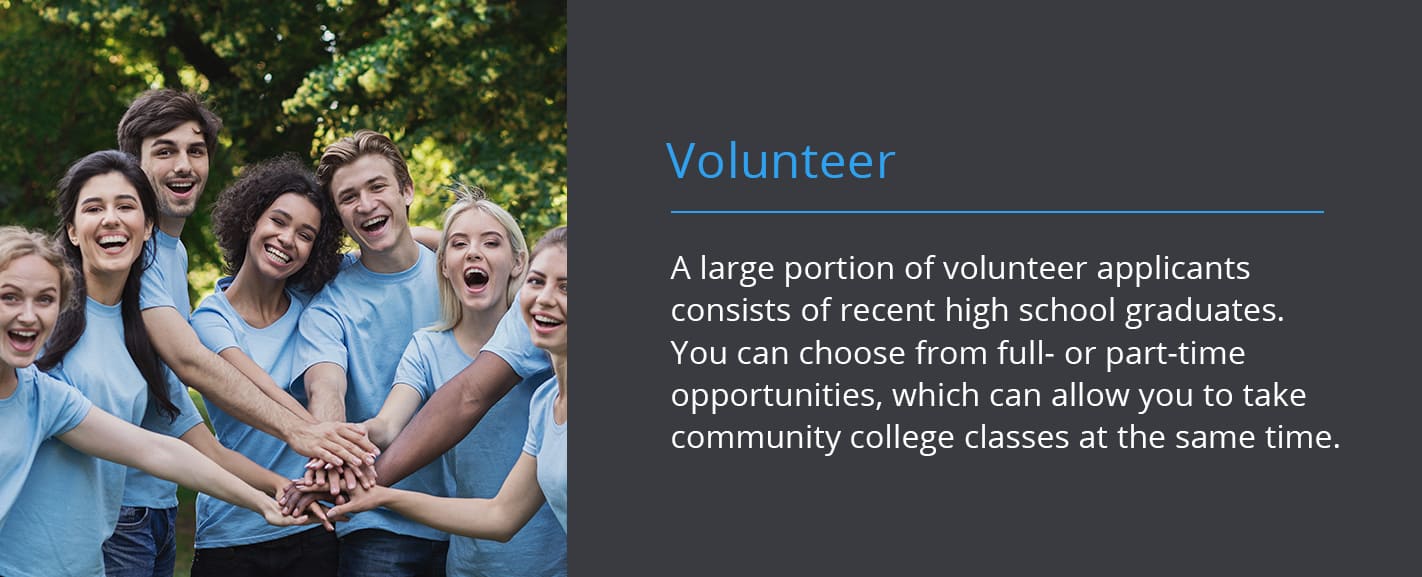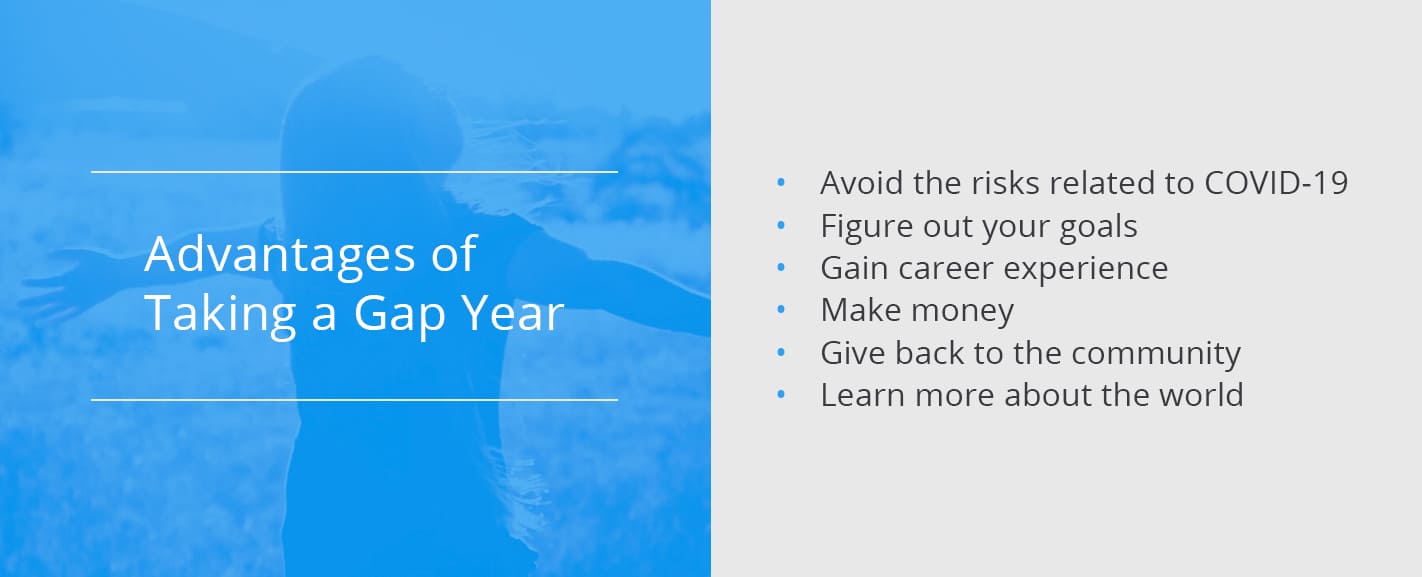If you are a high school senior or recent graduate who isn’t sure what to major in, you’re not alone. Many 18-year-olds are still discovering who they are, what they want and where they’re going. As such, it makes more sense for many young adults to take a gap year to learn more about themselves and the world.
What Is a Gap Year?
A gap year is a period, typically a year or semester, of experiential learning. Young people often take this gap year after high school and before starting college classes or a career. A gap year can deepen your personal awareness and give you more time to figure out what path you want to follow. Unfortunately, many parents worry that if their child takes a gap year, they won’t go back to school and they’ll become stuck in a menial job. The good news for parents is that 90% of students who take a gap year enroll within a year at a four-year institution. A gap year before college is also linked to improved job satisfaction and higher college GPAs. Some universities even encourage gap years, including Harvard. Amid COVID-19, taking a gap year is more appealing than ever to both students and concerned parents.
What to Do During a Gap Year
Next, you may be wondering how to take a gap year. When you or your child takes a gap year, you have plenty of options for what to do during that time:
1. Travel to New Places
A popular choice during a gap year is to travel. Many go abroad and travel to several different countries. For some, the socialization, spontaneity and lack of structure can lead to incredible intellectual and emotional growth. Students who have been feeling immense external pressure in high school may want to use a gap year to detox from this stress. Travel isn’t possible for everyone, however, especially during COVID-19. Fortunately, you can make plenty of other choices for your gap year.
2. Volunteer

3. Work
For some recent graduates, a gap year is more of a necessity than an option. Taking a year to work can enable them to earn money and save for the myriad college expenses they’ll need to cover. When you have a nest egg prior to attending college, this can play a big role in whether you can successfully complete your schooling. College costs and the need to work are frequently cited reasons for why students drop out, so taking time to work and earn money beforehand can reduce your risk of financial difficulties when you do enroll.
4. Take an Internship
A gap year is a great opportunity to take an internship. In the wake of COVID-19, many companies are shifting to remote internships, both paid and unpaid, and this may be the perfect chance to apply for an internship in a location you don’t live in. Internships are an excellent way to gain experience in the field you want to work in and develop connections for future career opportunities.
5. Attend Community College
Finally, you may also spend your gap year taking a few classes at your local community college. This can allow you to earn some credits during your gap year that can be transferred to a four-year institution. Community college also tends to be more affordable than many universities, so you can take this time to earn credits for a lower cost.
Pros and Cons of Taking a Gap Year
How do you know if a gap year is the right option for you? Considering a gap year’s pros and cons may help you determine what the best choice is for your future.
Advantages of Taking a Gap Year

- Avoid the risks related to COVID-19: Taking a gap year during COVID-19 can keep you better protected during the pandemic. Attending college on campus may expose you to the virus, as you will be surrounded by many other students. Taking a gap year could keep you safe and may also put your concerned parent at ease.
- Figure out your goals: A gap year can be a great option if you’re not sure what you want to study. You may not want to jump right into college without a clear goal. Spending a year traveling, working, volunteering or attending community college first can help you figure out what your goals are before you make this big life decision. For many students who take a gap year, this can help them discover their purpose in life and prepare for higher education.
- Gain career experience: If you use your gap year to work, you can gain career experience. This experience can help you determine whether this is the right career choice for you and give you better insight into what working in this field may actually be like. This work experience can also help you find employment after you graduate.
- Make money: With the already staggering costs of higher education continuing to increase, many students may spend their gap year making money in preparation for living on campus and on their own for the first time. Beyond the cost of your degree, you may also need to cover the expenses of room and board, food, books, study materials, a laptop and dorm room furniture and appliances.
- Give back to the community: A gap year can give you time to engage in a volunteer program or international study. Several gap year programs are organized with the intention of providing students with structure and education. If this sounds appealing to you, you may want to consider choosing one of these programs with a stated purpose.
- Learn more about the world: Many students who take a gap year use this time to travel and develop a greater understanding of our world. Spending time abroad can help you learn how to better communicate with people from various backgrounds and learn more about different cultures. Though you might learn about the world by watching documentaries or reading books, these experiences simply cannot be as immersive as seeing a new place firsthand.
Disadvantages of Taking a Gap Year
Though there are many advantages to taking a gap year, there are also some disadvantages:
- Falling out of the rhythm of school: When you take a year off in between high school and college, you may fall out of the rhythm of school. School gives us structure and goals, and when you take a lengthy amount of time away from this structure, you may experience some difficulty returning to it.
- Taking a gap year that turns into gap years: Many parents fear that if their child takes a gap year, this will lead to them getting sidetracked and becoming aimless, never to return to school. While this is not the case for most students who take a gap year, it can become a student’s reality if they don’t have solid plans about how to utilize this time.
Seek Guidance on Whether You Should Take a Gap Year
At Merrimack Valley Psychological Associates, our team of compassionate clinicians is focused on helping individuals with their mental health. We want to help you improve your quality of life, academic or work performance and your relationships with your loved ones and yourself. We can even aid you or your child in making a big life decision like whether to go straight to college or take a gap year. If you are considering a gap year, seek guidance about what you should do after high school by scheduling an appointment with us at Merrimack Valley Psychological Associates.
Reviewed By
Dr. David Rainen, PsyD.
I am a licensed clinical psychologist with an extensive background treating a variety of different ages, situations, emotional and mental health disorders in individuals and their families. As part of my 10 year professional and training career in psychology, I have developed and refined my skills and approaches through my work in a variety of diverse settings including: hospitals, community outpatient facilities, college counseling centers, secure and unsecure inpatient/residential treatment programs, and therapeutic day schools.


